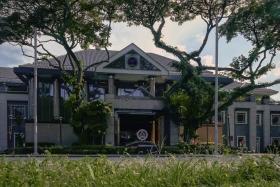Documentary teaches maids dangers of radicalisation
Dian Yulia Novi used to work as a maid in Singapore between 2008 and 2009. After that, the Indonesian foreign domestic worker went to Taiwan to work, where she was radicalised online.
She later married a pro-Islamic State in Iraq and Syria (ISIS) militant, and the then 28-year-old was jailed in Indonesia for 71/2 years for plotting to blow herself up outside Jakarta's presidential palace in 2016.
"Through Facebook, for at least one year, I opened the pages of those with jihadi status. It inspired me," said Novi in an interview with Dr Noor Huda Ismail, who produced the documentary Pengantin, or Bride, which was screened to 250 foreign domestic helpers at Masjid Kampung Siglap yesterday.
The documentary tells the stories of three Indonesian maids looking for love, two of whom were later jailed for their involvement in terrorist-related activities.
The documentary screening and the dialogue that followed with Dr Noor Huda, a visiting fellow at the S. Rajaratnam School of International Studies, and members of the Religious Rehabilitation Group (RRG) were organised by the mosque and the RRG, which aims to correct misinterpretation of Islamic concepts and dispel the extremist and terrorist ideologies associated with them.
They are part of efforts to reach out to the community, against the backdrop of growing ideological threats such as Singapore seeing cases of individuals being radicalised online, said Dr Mohamed Ali, vice-chairman of RRG.
REPATRIATED
According to the Singapore Terrorism Threat Assessment Report released in January, 14 Indonesian maids have been repatriated, after they were found to have been radicalised, since 2015.
In July 2017, then Second Minister for Home Affairs Desmond Lee gave details of two radicalised maids who had been repatriated.
"Similar to the earlier cases, both of them were ISIS supporters, radicalised through social media."
Since the documentary was made last year, about 650 domestic workers have seen it at screenings at the Indonesian Embassy and three other mosques in Singapore.
At post-screening surveys of 64 domestic workers, most of them, when asked what they would do if someone sent them a link inviting them to fight in a religious-based conflict area, indicated that they would ignore the link or report it to the authorities.
However, 33 per cent of the 26 survey respondents at the Indonesian Embassy and 17 per cent of the 12 respondents at Alkaff Mosque said they would still befriend a radicalised person, as long as they themselves were not radicalised.
At yesterday's dialogue, several maids asked the religious leaders questions. Ms Nanik Sarmini, 44, who has worked here for 16 years, asked how someone who has been radicalised could be spotted.
She was told to look out for certain markers, such as when they become isolated or when they talk about being violent towards people whose views differ from theirs.
Get The New Paper on your phone with the free TNP app. Download from the Apple App Store or Google Play Store now



